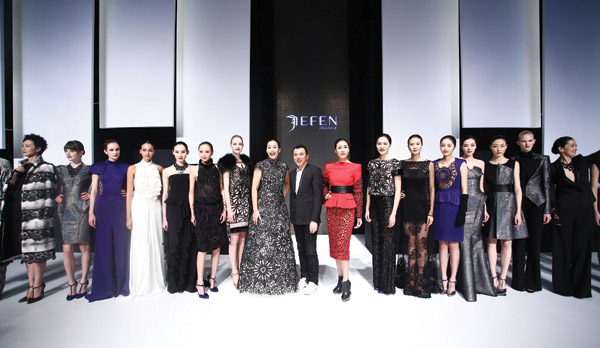Brand builder returns in triumph from French fashion scene
|
 Xie Feng says his designs have a strong European influence, but that they also contain Chinese elements. [Photo / Provided to China Daily]
|
Designer realized a dream but now concentrates on China's market
For Chinese fashion designer Xie Feng the idea of his clothes appearing at a Paris fashion show was a "dream". But seven years ago the founder of Jefen not only realized that dream, but he also became a pioneer as the first Chinese designer to show at the French capital's famous fashion week.
Now he is pushing his clothes among China's fashion-conscious crowd and sees a growing audience for Chinese design worldwide.
Although Jefen was registered in Italy in 1998, the 2006 Paris Fashion Week was the first time Xie took his brand to the European market.
It was a defining moment for the Chinese fashionista, who had long imagined his designs being strutted along a Parisian catwalk.
"Before going there I had regarded it as a personal dream. But standing there, watching people look at my clothes, I realized it was a sign that it is time for Chinese brands and designers," he says.
Xie, who formerly worked for Japanese fashion house Nicole Company for almost 10 years, has shown his designs eight times at Paris Fashion Week and also expanded his business with a strong focus on the emerging Chinese market.
China was in fact Xie's original market for the Jefen brand. Despite registering in Europe, its first sales were in China, where it targeted "independent women" between 30 and 40, with Italian wool, silk and linen fabrics that were "comfortable and noble".
Xie promoted Jefen then, and still does, as a high-end Chinese brand, in part because he did not want it to become confused with Italian brand fakes, which litter China's clothing markets.
It was initially a tough sell, but Xie has managed to establish a market for Jefen and expand the company from three staff to more than 600, with turnover in excess of 400 million yuan ($65 million) last year.
"We are growing on average 30 to 40 percent a year, except for 2012 when turnover increased by just 20 percent because of a slowdown in the economy," says Xie.
This year marks another turning point for the company, which released its latest clothing collection, Samsara, at Beijing Fashion Week in April. Xie says it is undergoing a "rebirth" to become a larger brand.
"We are figuring out how to make the jump," he says. "As I am employing more people I feel I have a responsibility to expand the business to offer them a better life. I hope to have a quality design team working for the company instead of just myself."
These are ambitious plans for Jefen, whose business life began in a 20-square-meter shop on the fifth floor of Scitech Plaza, one of Beijing's first high-end shopping malls. The company now has 80 shops across China.
In the early days it was difficult for the shop to attract customers. "We were placed among children's brands and out-of-season clothing sales areas in the shopping mall in 2000 and few people knew much about designer brands at that time," Xie says.



















